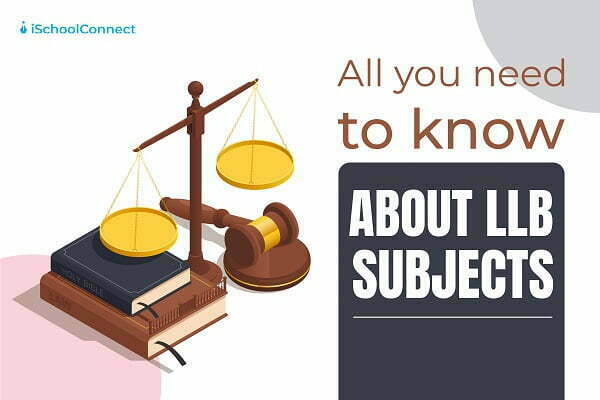Table of Contents
Its goal is to provide students with a solid grasp of legal concepts and ideas, as well as the social, political, and economic context in which they live. However, you must ace the Law School Admission Test (LSAT) as well as an English language certification such as IELTS or TOEFL to get accepted into top universities throughout the world.
Students can choose what field they want to establish a career in based on the individual courses that they want to study.
The LLB course subjects are structured in such a way that every area of law may be covered in the three-year program.
The LLB subjects semester wise breakdown of the subjects that is typically followed by all Top Universities offering the course below –
Year 1
The first semester focuses on the introduction to crime and laws about women, family, and labor and serves as a foundation for the topics to be taught ahead in the course.
The second semester walks you through the constitutional aspects of the law as well as the laws about the professional front.
Semester 1
- Labor law
- Family law I
- Crime
- Women and law
Semester 2
- Family laws II
- Law of Tort and consumer protection act
- Constitutional law
- Professional ethics
Year 2
The 3rd semester focuses on human and international laws along the environmental aspect to the subject. The set of law subjects in LLB delves deeper into the laws regarding evidence and aspects like arbitration and conciliation.
The 4th semester walks you through the practical training for legal aid. With LLB subjects like jurisprudence. The semester goes through the proprietary laws and other subjects related to it. It also includes the International economic laws to walk you through the legal aspects of corporate legal rules.
Semester 3
- Law of evidence
- Human rights and international law
- Environmental law
- Arbitration, conciliation, and alternative
Semester 4
- Jurisprudence
- Practical training – legal aid
- Property law
- International Economic law
Year 3
Semester 5 dives deeper into the LLB subjects and walks you through the in-depth interpretation of statutes. This semester focuses on detailed aspects such as legal writing, and the land laws.
The 6th semester further dives deep into the criminal laws and procedures. To sum up the course, the last semester also helps you with practical experience in the field.
The LLB final year subjects include –
Semester 5
- Civil procedure code (CPC)
- Interpretation of Statutes
- Legal writing
- Land laws
- Administrative law
Semester 6
- Code of criminal procedure
- Company law
- Practical Training – Moot court
- Practical training II – Drafting
- Criminology

Optional subjects
In general, the LLB course syllabus is divided into core and optional subjects.
Students can practice as a junior under a senior attorney beginning in their third-year final semester to obtain exposure and experience.
Internships are also an integral part of the legal education process.
- Contract
- Trust
- Women & Law
- Criminology
- International Economics Law
Eligibility
You must fulfill the entrance exam’s qualifying requirements as well as the requirements of the college to which they are asking for admission. The following is a list of the basic minimum requirements for the LLB course-
- You must have passed a graduate exam from a recognized university in any field.
- This criterion varies based on the college to which the individual has applied. However, the majority of top universities need a minimum of 50% in the aggregate.
- If you are in the final year are eligible to apply, but must meet all eligibility requirements at the time of admission.
Those who satisfy all of the qualifying requirements can apply online or offline, depending on the institution’s resources and the aspirant’s preferences. You can fill up the form and submit it along with the necessary papers.
The admission exam score or merit is used to select all applicants. Students must submit their papers for verification after receiving admission and then pay the college fees to reserve their places in the program.
Entrance exams

The university administers LLB entrance examinations statewide and nationally. Students should pass the competitive entrance exams to secure a seat in the institute or college. The following are some of the most popular LLB entrance exams–
- CLAT
- LSAT
- SLAT
- CUET
What we have to say
- Law professionals can work in a variety of settings, including litigation, the court, in-house counsel for businesses, legal officials and consultants, and more.
- In the current age, law professionals work in multinational law firms as a result of the transnational character of the legal profession.
- In short, there are multiple occupations available in the legal area, including multinational corporations, international organizations such as the United Nations, academia, courtroom practice, Judicial Services, and Civil Service, among others.
- The varied fronts allow students to have multiple choices when selecting the firm of their choice.
We hope you found this blog informative. Don’t forget to comment below and share your thoughts! You can also get in touch with us if you have any doubts.
Liked this blog? Read: Cyber Law course | Everything you need to know about this course!
FAQ’s
Q1. What are the branches of LLB?
Answer – Some of the branches of LLB include –
- International Law
- Business Law
- European Law
- Criminal Law
- Legal Studies
Q2. What are the four types of laws?
Answer – The four types of laws include – common, civil, criminal, and statute.
Q3. Is mathematics required to opt for a law course?
Answer – No, mathematics is not required to opt for law courses.






